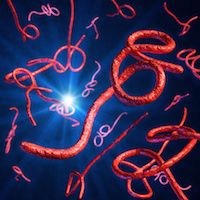Ebola Outbreak Over in Africa's Three Hardest-Hit Countries, But There's Bad News
The good news is that the Ebola outbreak in Liberia has been declared over as of January 14 – so what could possibly be the downside? Well, officials revealed that there have already been flare-ups of the disease and they expect more.

Update: Since this article has been published, a new case of Ebola emerged in Sierra Leone, the World Health Organization (WHO) confirmed on January 15, 2016.
The good news is that the Ebola outbreak in Liberia has been declared over as of January 14 — so what could possibly be the downside? Well, officials revealed that there have already been flare-ups of the disease and they expect more.
This is the first time since the beginning of the outbreak in 2014 that Africa’s three hardest-hit countries are all Ebola-free at the same time. The disease infected more than 28,500 people and killed at least 11,300 of them during the most recent outbreak. The World Health Organization (WHO) first declared Liberia Ebola-free in May 2015, but the virus popped up two times after that — in September and November. Sierra Leone was declared free of Ebola transmission on November 7, 2015 and Guinea received the same status on December 29, 2015.
A country is declared free of Ebola after 42 days (two 21-day incubation cycles of the virus) after the last confirmed patient tested negative for the virus two times. While it is great news that Liberia has made it to this point again, it’s far from the end of the road.
- The MD Magazine Ebola condition center
“WHO commends Liberia’s government and people on their effective response to this recent re-emergence of Ebola,” Alex Gasasira, MBChB, WHO Representative in Liberia, said in a news release.
Liberia now enters a 90-day period of heightened surveillance. During this time, WHO will continue to support the effort to prevent the disease from resurfacing and will respond if that were to happen.
Margaret Chan, MD, WHO Director-General, described the Ebola-free status as a “monumental achievement” and continued with: “So much was needed and so much was accomplished by national authorities, heroic health workers, civil society, local and international organizations, and generous partners. But our work is not done and vigilance is necessary to prevent new outbreaks.”
Liberia, Sierra Leone, and Guinea are all still considered high risk for additional small outbreaks of Ebola. There have been 10 flare-ups of the disease unrelated to the original 2014 outbreak so far. The virus has the ability to persist in survivors even after they have recovered, and although rare, male survivors can pass on the disease through semen up to one year afterwards.
“A massive effort is underway to ensure robust prevention, surveillance, and response capacity across all three countries by the end of March,” concluded Bruce Aylward, MD, WHO’s Special Representative for the Ebola Response.
What to Read Next >>> President Obama Addresses Ebola During State of the Union